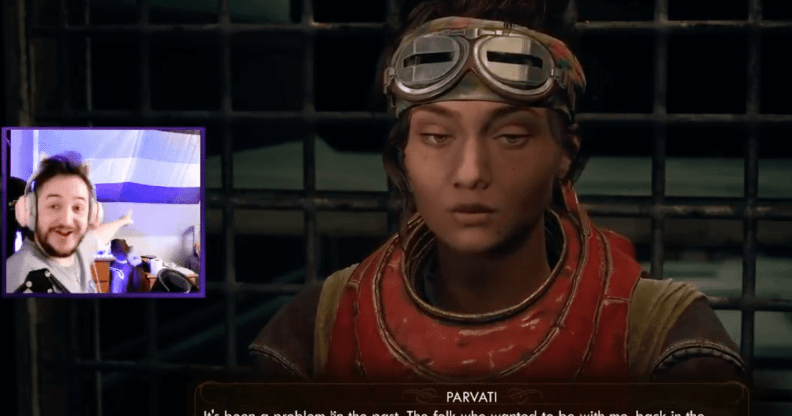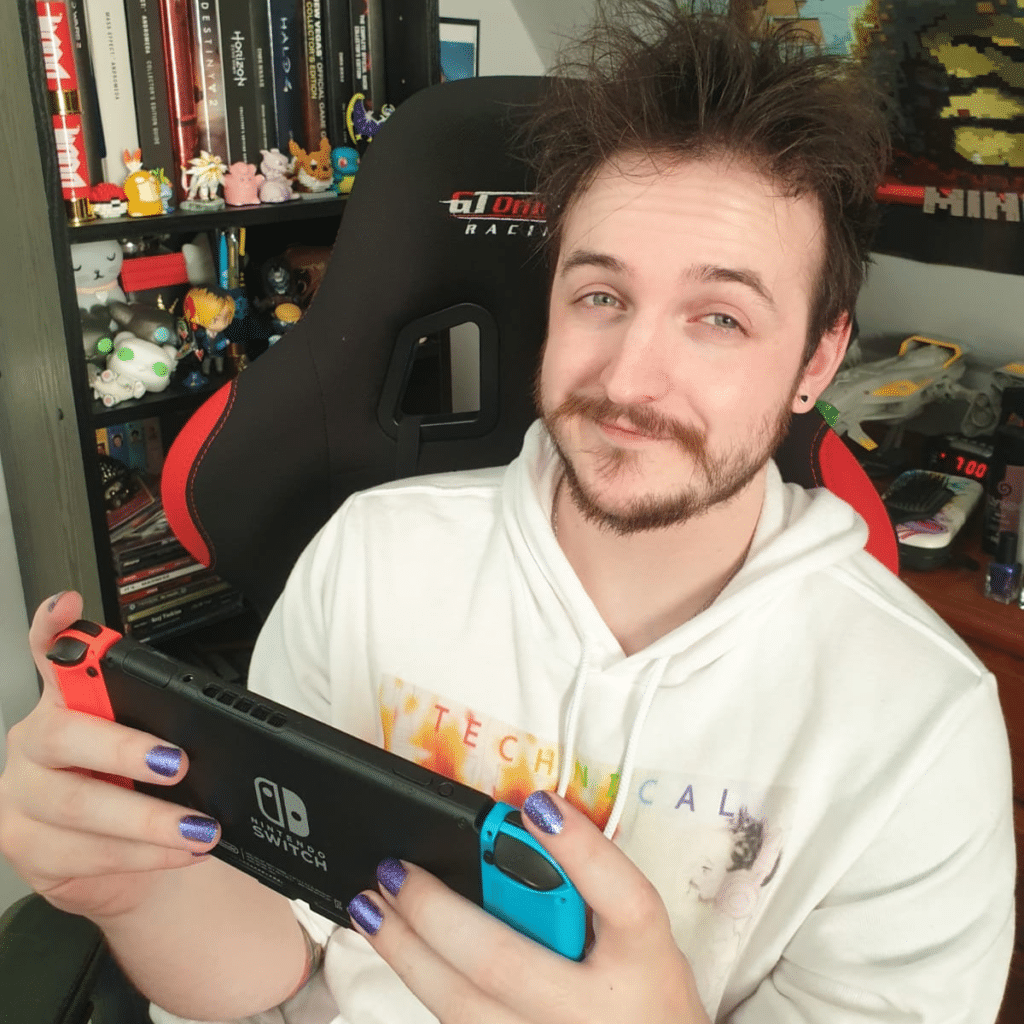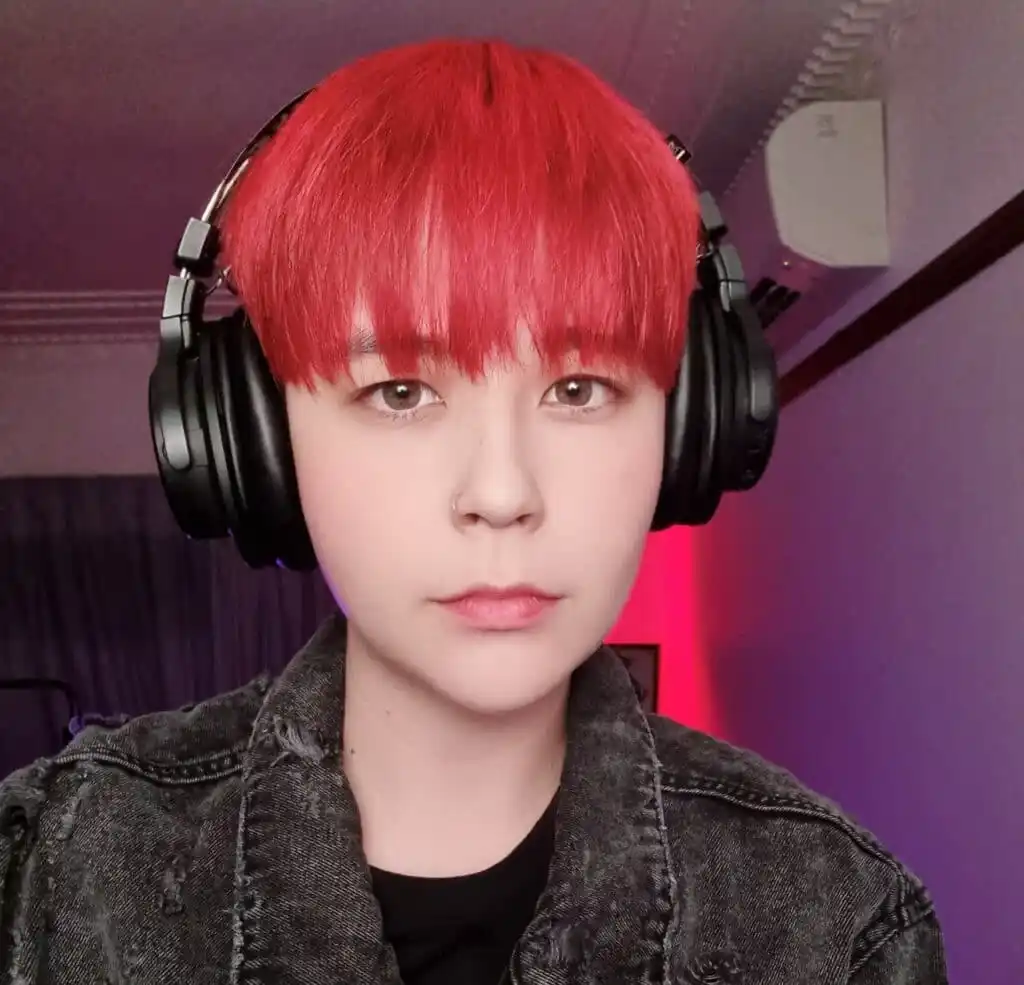Asexual gamers explain why representation in games is so vitally important: ‘I’m not broken for once’

CauseImEd. (Twitch)
CauseImEd. (Twitch)
“I’m not much interested in… physical stuff,” says Parvati. Ed’s face slowly widens into a grin as the realisation hits him. He points at the flag behind him. This is what asexual representation looks like.
“When I figured out that [Parvati] was [ace], it was like getting a surprise birthday party for me,” says Twitch streamer CauseImEd. “It felt like there was somebody there that was there specifically for me”.
Ed was playing Obsidian’s space RPG The Outer Worlds and while he knew the game included ace representation, he didn’t know how. It wasn’t until the character Parvati revealed it in-game that the penny dropped for Ed, a moment captured in a clip and shared on Twitter.
Honestly this game has made me so incredibly happy, this is the first time I've seen ACTUAL ASEXUAL REPRESENTATION!!💜🖤🤍
There's a whole side quest about her struggling with being different & I just, it's me represented in a video game & it just made me feel seen you know?😭💜 pic.twitter.com/CA5fDggOfw
— CauseImEd – Streamer! (Returning Soon) 🍉 (@CauseImEd) July 7, 2021
Parvati is a rare example of asexuality in video games. It’s an identity in the LGBT+ community that’s rarely explored – Parvati was the first asexual character Ed had seen in a game. That’s why she had such a profound impact on him.
“Ace representation is something that I kind of expected to be on the back burner when it came to queer rep,” says Ed. “ I always thought [it] would just be in the background, and we never were really going to have that discussion for maybe a few decades.”
So what is asexuality?
Asexuality, shortened to ace, is – like many queer identities – a spectrum. In essence, asexuality is not experiencing sexual attraction to people of any gender. But there’s a spectrum of being sex indifferent and sex repulsed. And that can change depending on the sexual act, whether feelings are reciprocated, or it could change over time.
Yet with asexuality so under-represented across media, it’s frequently misunderstood – especially when media as a whole is so often sexualised. Ed, for instance, only came out as ace earlier this year.
“I always knew what I was, but I didn’t know the word for it,” he says. Instead he had the feeling “that you’re different to everyone, you’re broken, you’re not right, there’s something wrong with you because [sex] is such a big part of life and society and everything that if you are not a part of this, then you’re obviously not right.
“When I actually started meeting ace people and understanding and really learning more about myself, it was like everything clicked in place and finally made me feel that I’m not broken for once.”
MoniDoesStuff, one half of the Geek Herring Twitch account, feels similarly.
“I didn’t even really know asexuality existed until 2020 so by the time I came out as ace, I was 36,” she says. “When I grew up there was zero representation, no mention of asexuality anywhere and as a teenager you mimic what others do, and think that’s how it’s supposed to be and just hope at some point your body and your mind will catch up.”
It was only through extensive personal research that she discovered she was asexual. Had the games she played included ace representation, it may have planted a seed earlier on. Instead, representation is a rare occurrence.
As she says: “When you have no ingredients, you can’t bake the cake that you want but instead have to go with what everyone else is telling you, which is why it is so important to equip people with the perfect set of ingredients so they can bake their favourite cake.”
"Let's use motion controls!", they said….. "It will be fun!", they said! 🤦🏻♀️ pic.twitter.com/hgZ3cQAcr3— MoniDoesStuff 🎮 (@monidoesstuff) July 24, 2021
More representation, in gaming and other media, would allow ace people to identify and feel comfortable in their sexuality much earlier.
As Twitch streamer and Rainbow Arcade member Dubu says: “Sex and romance are such huge factors in everything from films to games, so having asexual representation that we can connect to is so validating and exciting to see.
“It needs to be accurate and not seen as an obstacle or ‘illness’, but something that is normal and valid.”
Yet asexuality is certainly misunderstood in gaming. Take a game like Mass Effect, for instance, a game that’s lauded for its romance options. Surely if you’re asexual you can just choose to not partake in those relationships, right?
“Being ace isn’t just choosing not to be [sexual],” says Ed. “It’s not even having that kind of option to just be like, ‘no’”.
And in Mass Effect, saying no is surprisingly difficult. “I did try quite literally doing nobody. I think I accidentally bedded two people,” jokes Ed. “I tried playing Renegade and being the biggest piece of sh*t I could, and I think I bedded the reporter.
“As funny as it is, it’s quite a good metaphor for [asexuality] because for a lot of people sadly the whole ‘no means no’ thing is very misunderstood. A lot of people just don’t quite register [being ace], they think it’s an excuse or maybe you just haven’t met the right person.”
Parvati as asexual representation
Parvati is a good example of asexual representation because she’s so honest. The first companion you meet in The Outer Worlds, she’s naturally restless and easy to warm to.
But as she opens up about her potential relationship with another woman in the game, her anxiety about sex is revealed. As much as she yearns for Junlei the engineer, she gradually voices concern to the player about how her lack of interest in “physical stuff” might be perceived.
It’s even entirely possible to miss these nods to Parvati’s sexuality, should you choose to opt out of certain conversations with her.
For Ed, what struck a chord was how anxious Parvati was in opening up and how she discussed past relationships. “Even people that she thought loved her when it came down to it, if she couldn’t provide the thing that she assumed was such a vital part, then they didn’t actually want to be with her. And that really hit home,” says Ed.

CauseImEd.
This isn’t asexual representation as just ‘no sex’. This is a character who’s open and honest about her specific identity. For ace people, it’s incredibly powerful and validating.
One downside, though, is that Parvati never describes herself using the term “asexual”. Perhaps this is intentional, reflecting Parvati’s own uncertainty. But for Ed it was a small disappointment.
“I loved everything about her, but if she’d actually said the word then anybody who may have still been questioning who played the game could go and look it up and learn,” says Ed.
What asexual representation is out there?
Parvati aside, there is very little asexual representation in gaming.
“The first time I saw any was in the game Arcade Spirits, one of my favourite games, where there are routes with aromantic/asexual representation,” says Dubu. “They give you the option to choose if you are interested in dating or not and seeing that option made me so incredibly happy.”
They also recommend Ace in Space, a narrative game about an asexual character who experiences romantic attraction with a robot. Moni is also keen to play this, as well as experience Parvati in The Outer Worlds herself.
“I don’t know if it’s even for me but the representation alone makes me want to dive into it,” she says.
So, if there’s so little asexual representation out there, what would good representation look like?
“I would love for games to show the entire spectrum of sex-positive, sex-neutral, and sex-repulsed asexuals in games,” says Moni. “Being asexual doesn’t mean you can’t be filthy, or you never have a conversation about sex ever, or that everything about sex makes you uncomfortable. There’s more about us than just not having sex, so I’d love for video games to explore that.”

dubusaeyo.
Dubu is also keen to see a diverse range of identities. “I would love to see more diverse representation of other asexual umbrella identities, and more acespec routes in visual novel games, where you don’t have to date one of the options, but can choose to stay friends,” they say.
“For me, I often dislike when there’s anything inherently romantic/sexual, so being able to play games where I can just have a good time going through the story would be amazing.”
Ed suggests a potential narrative. “I would really love a character that you actually see go through the same experiences that I and other people did where they’re growing up in a society that’s very sex forward and they try to go along with it, but find that they can’t, and they struggle,” he says.
“The good rep would be somebody who goes through the experience, grows up, and learns about it having gone through the experiences, which shows what people really go through and struggle with and why these people are repressed in their own way.”
Tackling this kind of narrative is certainly uncharted territory for gaming. But the possibilities of interactive storytelling lend themselves to exploring a diverse spectrum of identities. Asexuality deserves to be one of them.
For more gaming news, follow Gaymeo on Facebook and Twitter. You can also email us with any news or tips on [email protected]

